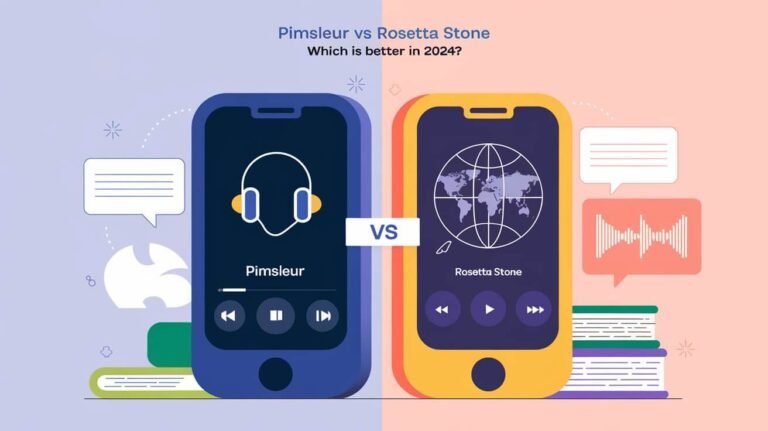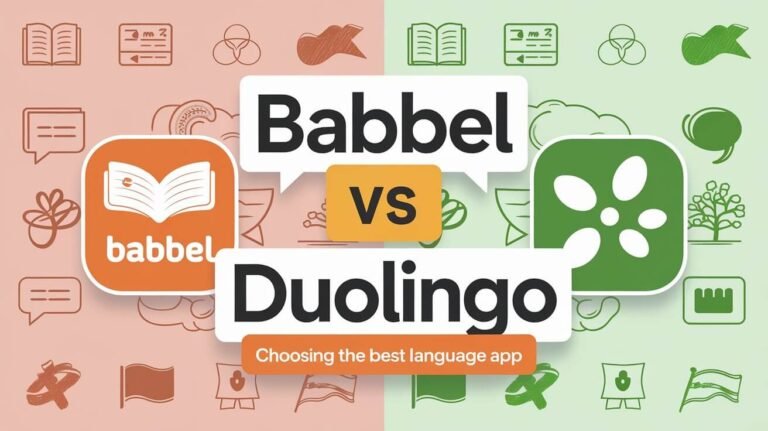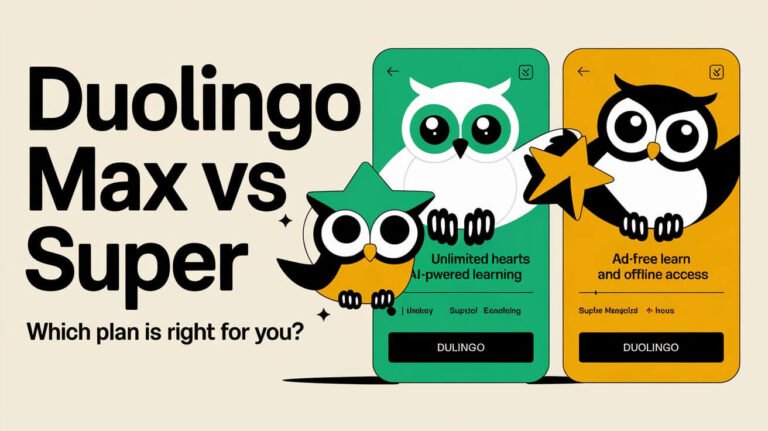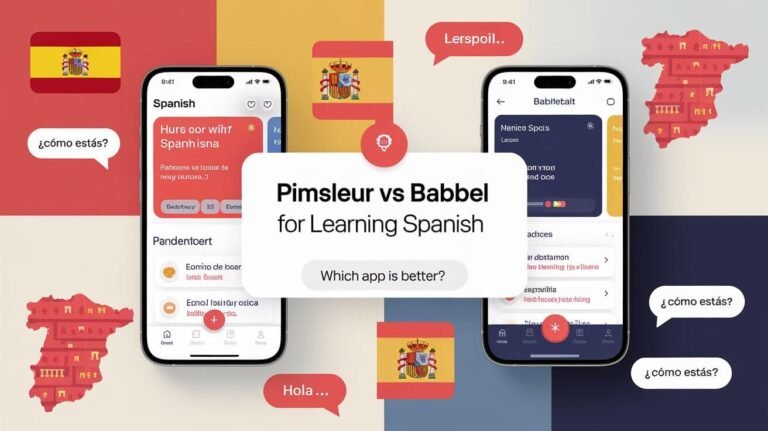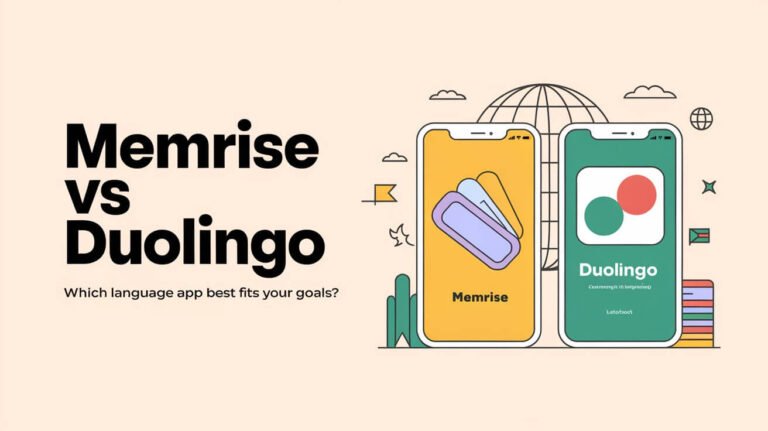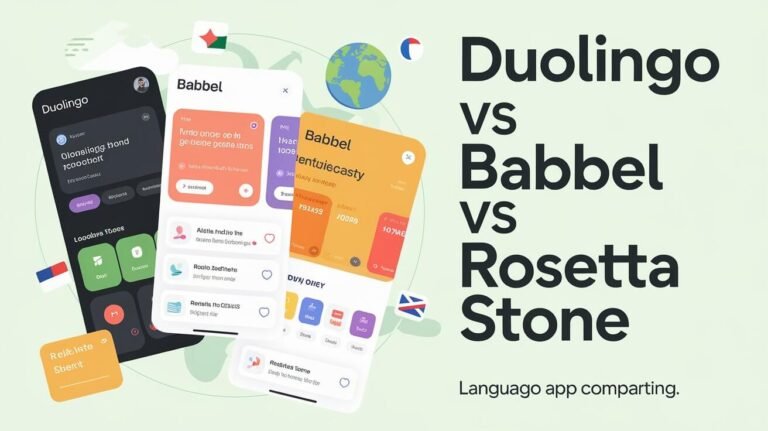Babbel Vs Rosetta Stone: Which App Is Better in 2024
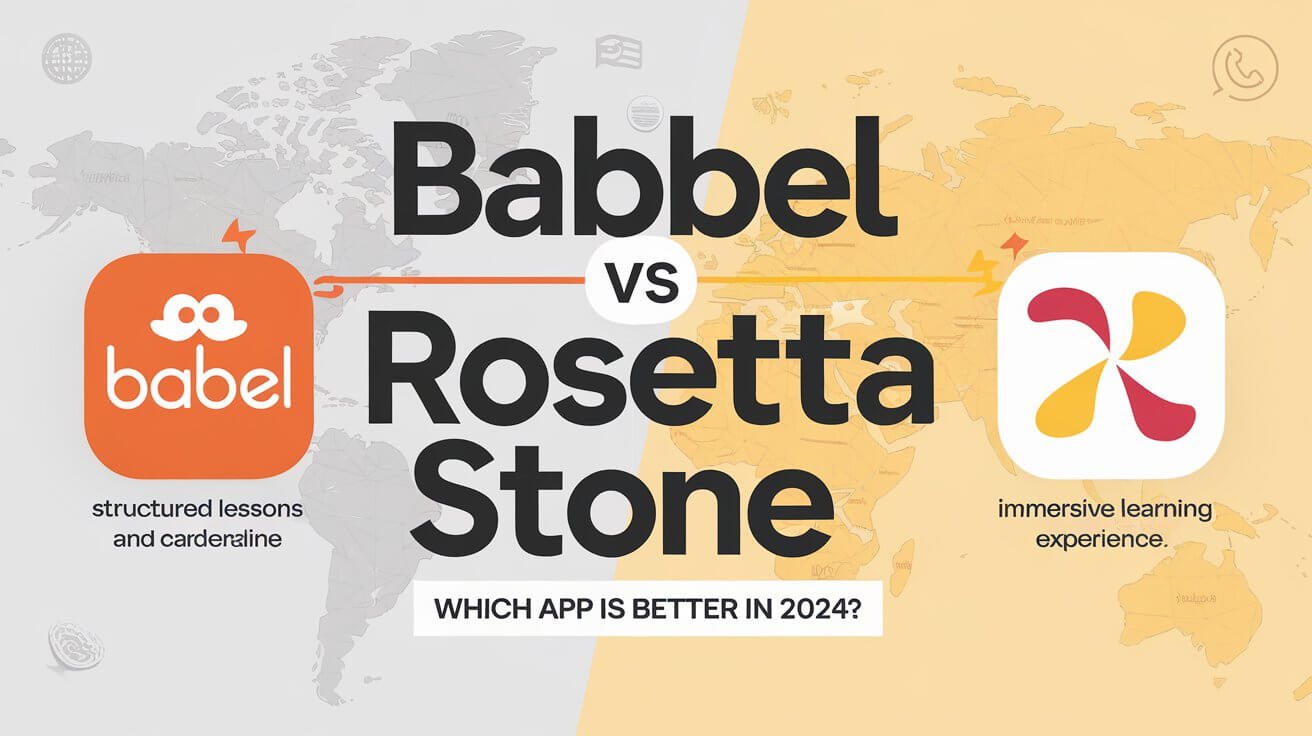
In the world of language learning, Babbel and Rosetta Stone stand out. They offer different ways to learn languages. Babbel focuses on grammar with short, fun lessons. Rosetta Stone uses pictures and sounds to help beginners talk like a local.
Babbel teaches 14 languages, while Rosetta Stone covers 25. This means more options for learners. Whether you want to learn a European or Asian language, both apps have what you need.
Core Features Comparison
Language learning apps have key features that make them stand out. Let’s look at how Babbel and Rosetta Stone compare. We’ll focus on speech recognition, user interface, and mobile app experience.
Speech Recognition Technology
Babbel uses a system that makes learning more effective. It has a responsive content and spaced repetition system (SRS). Rosetta Stone, on the other hand, has TruAccent speech recognition. It helps users improve their pronunciation.
User Interface Design
Babbel lets users customize their learning path. Rosetta Stone keeps its interface consistent. This makes learning feel more structured and familiar.
Mobile App Experience
Both apps are great for learning on the move. Babbel offers interactive lessons and exercises. These are tailored to the user’s needs.
Babbel and Rosetta Stone cater to different learning styles. Babbel’s flexibility and personalized approach might appeal to some. Rosetta Stone’s structured method and TruAccent technology might suit others. It all depends on what each user prefers.
Available Languages on Each Platform
Babbel and Rosetta Stone both offer a wide range of languages for learners. But, they differ in the number of languages available.
Babbel, a well-known app, teaches 14 languages. This includes Dutch, English, French, and many others. It’s great for those looking to learn widely spoken languages.
Rosetta Stone, on the other hand, offers 25 languages. It covers all the languages Babbel does and more. You can learn Arabic, Chinese, and many others with Rosetta Stone.
Rosetta Stone’s wide range of languages meets the need for more options. It’s perfect for those who want to learn many languages in today’s world.
| Language Options | Babbel | Rosetta Stone |
|---|---|---|
| Total Languages Offered | 14 | 25 |
| Unique Languages | Dutch, Danish, Indonesian, Norwegian | Arabic, Chinese, Tagalog, Greek, Hebrew, Hindi, Irish, Japanese, Korean, Latin, Farsi, Vietnamese |
Lesson Structure and Duration
Language learning apps have different lesson structures and durations. This affects how we learn. Babbel and Rosetta Stone, two top apps, have unique ways of teaching.
Babbel’s 10-15 Minute Format
Babbel’s lessons are short, lasting 10 to 15 minutes. This makes it easy to fit learning into a busy schedule. The app uses interactive drills to teach practical words and phrases.
These drills help learners build their skills quickly. They focus on everyday language and basic sentences.
Rosetta Stone’s Extended Sessions
Rosetta Stone’s lessons are longer, lasting about an hour. The app focuses on learning through context. Each session includes a 30-minute core module and 3 to 5 drills lasting 5 to 10 minutes.
This format offers a deeper learning experience. It helps learners develop a strong language foundation.
The lesson length shows the different learning formats of Babbel and Rosetta Stone. Babbel is great for those who like quick, focused lessons. Rosetta Stone is better for those who want a more in-depth, time-intensive learning experience.
Pricing Models and Subscription Options
Language learning apps have different pricing models and subscription options. Babbel and Rosetta Stone both offer subscription plans, but their costs vary a lot.
Babbel’s prices range from $8 to $15 a month, based on the subscription length. You can choose from monthly, quarterly, or annual plans. The annual plan is the cheapest. Babbel Live is a special subscription that includes group classes with a teacher and free app access.
| Subscription Plan | Babbel Cost | Rosetta Stone Cost |
|---|---|---|
| Monthly | $13.95 | $36 |
| Annual | $83.40 | $179 – $479 |
Rosetta Stone’s costs range from $10 to $15 a month. You can choose a single language or an all-access plan for all languages. But, the annual subscription for Rosetta Stone can be very expensive, from $179 to $479, depending on the languages and levels you want.
Babbel’s pricing is generally more affordable, great for those learning one language. Rosetta Stone’s prices can add up fast, if you want to learn many languages or levels.
Babbel Vs Rosetta Stone: Direct Comparison
Learning Methodology
Babbel and Rosetta Stone have different ways of teaching languages. Babbel uses a mix of English explanations and translations to help learners. Rosetta Stone, on the other hand, focuses on full immersion, with less English used.
Babbel’s lessons adjust to how each learner responds, making the pace and content fit their needs. Rosetta Stone, though, sticks to a set plan, offering a consistent learning experience. Both apps help track how well you’re doing.
Progress Tracking
Babbel tracks your progress closely, showing how you’re doing and where you need to get better. It gives detailed reports on lessons done, words learned, and goals reached.
Rosetta Stone also tracks your progress, but it’s not as tailored to you as Babbel’s. It uses a more standard way to see how you’re doing.
| Feature | Babbel | Rosetta Stone |
|---|---|---|
| Learning Methodology | Hybrid approach with English explanations and translations | Full immersion technique with limited English usage |
| Lesson Adaptation | Adaptive to user responses | Follows a set pattern |
| Progress Tracking | Responsive to individual learning patterns | Follows a more standardized approach |
Babbel and Rosetta Stone have unique teaching methods and ways to track your progress. They suit different learning styles and needs. Think about what you want to achieve when choosing between these apps.
Grammar Instruction Approaches
Babbel and Rosetta Stone have different ways of teaching grammar. Babbel adds grammar lessons in a smart way. It starts with short English explanations, then has exercises to practice what you’ve learned.
Rosetta Stone, on the other hand, doesn’t focus as much on explaining grammar rules. It uses drills and tasks to help you learn grammar naturally. The app uses pictures and clues to help you figure out language rules on your own.
These methods suit different learning styles. Babbel is great for those who like clear, structured lessons. Rosetta Stone is better for those who learn by doing and seeing the language in action.
Whether you choose Babbel or Rosetta Stone depends on how you like to learn. Both offer good ways to learn about grammar lessons, language structure, and syntax learning.
Speaking Practice and Pronunciation Tools
Babbel and Rosetta Stone both help you get better at speaking and pronunciation. But Rosetta Stone focuses more on these skills than Babbel does.
Voice Recognition Accuracy
Rosetta Stone’s TruAccent is known for being top-notch in language learning. It gives you precise feedback on how you sound. Babbel also has speech recognition, but it’s not as advanced as TruAccent.
Conversation Practice Methods
Babbel has Babbel Live, which lets you talk with a native speaker. This makes your speaking skills better. Rosetta Stone uses app tools and exercises for practice, but you don’t get to talk with someone directly.
| Feature | Babbel | Rosetta Stone |
|---|---|---|
| Speech Recognition Accuracy | Moderate | Advanced (TruAccent) |
| Conversation Practice | Babbel Live (one-on-one) | App-based exercises |
Rosetta Stone focuses more on speaking and pronunciation with its advanced technology. Babbel offers a broader approach, including grammar and interactive exercises, to help with speaking skills.
Visual Learning Elements
Visual aids are key in language learning apps. Babbel and Rosetta Stone both use visuals, but in different ways.
Rosetta Stone uses lots of images and audio together. It asks users to match words with pictures. This helps visual learners who like seeing words with pictures.
Babbel also uses visuals, but not as much as Rosetta Stone. It has interactive exercises like fill-in-the-blank and conversations. This mix of visuals, sounds, and actions might suit learners who like variety.
- Rosetta Stone heavily relies on imagery and visual cues in its lessons, using a combination of images and audio for learning.
- Babbel incorporates some visual elements, but its lessons are more focused on interactive exercises rather than extensive use of visual aids.
- The choice between Babbel’s balanced approach and Rosetta Stone’s image-based learning may depend on the individual learner’s preferences and learning style.
Language Immersion Techniques
The debate on the best way to learn a language is ongoing. Rosetta Stone and Babbel are two leading apps with different methods. Each has its own strengths.
Rosetta Stone’s Full Immersion
Rosetta Stone uses a full immersion method. It focuses on visual cues and intuition, without English help. This “dynamic immersion” technique helps learners connect words directly to the language.
It’s tough for beginners but aims for natural, long-term learning.
Babbel’s Hybrid Approach
Babbel takes a hybrid approach. It mixes immersive elements with English instructions and translations. This method helps learners build a strong foundation while enjoying the immersive experience.
Babbel’s lessons are short and varied. They include exercises like listen-and-repeat and fill-in-the-blanks.
Choosing between Rosetta Stone and Babbel depends on your learning style. Rosetta Stone is great for those wanting a natural, long-term learning experience. Babbel’s hybrid method is better for beginners or those who like English support.
Supplemental Learning Resources
Babbel and Rosetta Stone offer more than just lessons. They have extra resources to help you learn more. These tools make your learning experience better and help you move forward in your studies.
Rosetta Stone gives you lots of extra stuff. You get phrasebooks, video lessons, and short stories. These help you get into the real language and culture.
Babbel focuses on structured extra resources. It has daily review sessions. These sessions use fun exercises to help you remember what you learned.
Both platforms aim to give you a full learning experience. Rosetta Stone has a wide range of extras. Babbel emphasizes regular practice and targeted exercises. Your choice depends on what you like and how you learn best.
| Babbel | Rosetta Stone |
|---|---|
| Quick-hit daily review sessions | Phrasebooks, on-demand videos, and short stories |
| Variety of drill-based exercises | Immersive learning experiences |
| Reinforcement of vocabulary and grammar | Exposure to authentic language and cultural contexts |
Choose Babbel for a structured learning path or Rosetta Stone for a more immersive experience. Both offer additional learning tools and extra study materials to help you on your language journey.
Student Progress Assessment
Understanding your progress in language learning is key to staying motivated and reaching your goals. Babbel and Rosetta Stone have different ways to check how you’re doing. They meet the needs of various learners.
Babbel starts by asking you to rate your current language skills. This helps the app adjust the lessons to fit your level. As you go through lessons, Babbel keeps an eye on your progress. It gives you feedback and changes the lessons to help you improve.
Rosetta Stone has a set path for learning. It doesn’t check your skills at first, but lets you pick where to start. As you finish lessons, Rosetta Stone shows you how you’re doing and what you need to work on.
Both Babbel and Rosetta Stone have strong learning evaluation, progress tracking, and skill assessment tools. They help you see how you’re doing and decide what to do next. Knowing how each platform works helps you pick the one that fits your learning style and goals.
Cultural Context Integration
In the world of language learning apps, cultural immersion is key. It helps learners understand the language better. Babbel and Rosetta Stone both focus on this, but in different ways.
Real-world Applications
Rosetta Stone focuses on practical, real-life content. It helps users learn to speak and understand in everyday situations. This includes travel and daily conversations.
Using real conversations and settings, Rosetta Stone prepares users for different cultural situations.
Cultural Learning Elements
Babbel works on building flexible language skills. These skills are useful in many situations, like reading or watching TV. Babbel also supports niche interests, like Spanish, with a deep dive into cultural nuances.
Other apps like Duolingo, Memrise, and Busuu also add cultural learning to their lessons. Duolingo has “Stories” and podcasts for cultural context. Memrise uses videos of native speakers in real-life settings. Busuu includes cultural tips and encourages community exchange.
| App | Cultural Learning Elements | Languages Covered |
|---|---|---|
| Rosetta Stone | Authentic conversations, contextual settings | 25 languages |
| Babbel | Integrated cultural insights, niche interests | 14 languages |
| Duolingo | Stories, podcasts, cultural background | 40+ languages |
| Memrise | Videos of native speakers, real-world contexts | 20+ languages |
| Busuu | Cultural tips, community engagement | 12 languages |
Language learning apps that include cultural elements make learning more engaging. They help learners understand different cultures and languages. This way, users become more aware and adaptable in real-life situations.
Platform Accessibility Features
Babbel and Rosetta Stone make learning languages easy for everyone. Babbel is great for English speakers because it uses English instructions. This helps beginners get started easily. Rosetta Stone keeps its interface the same for all languages, which can be tough for beginners.
But both platforms aim to make learning fun and accessible. Babbel focuses on practical skills, while Rosetta Stone uses an immersive approach. This means you can pick the method that fits your learning style best.
So, whether you like to see things or follow a plan, there’s a platform for you. Babbel and Rosetta Stone both offer features to help you learn a new language. Your choice will depend on what you prefer.

